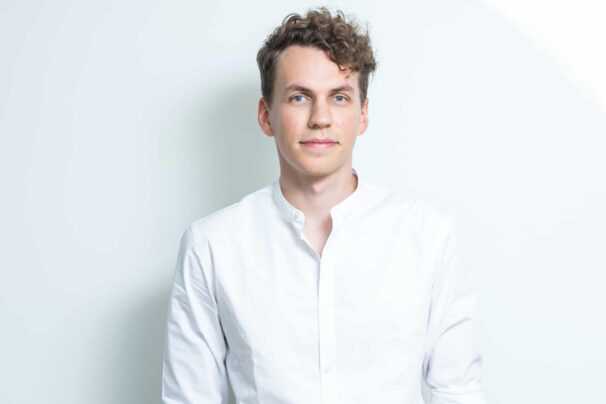Before Toggl–the triple threat suite of productivity tools–there was Toggl the timer. It was born within a software consultancy in response to a question that no other app seemed able to answer: Where was all their time going?
More than a decade has passed since these software consultants created the timer and founded Toggl (now Toggl Track), but the basic premise hasn’t changed. Toggl Track aims to show you how you’re spending your time–so you can spend it on what matters.
But if some things have remained constant, in other ways there have been some pretty significant changes, many fairly recent. We sat down for a distanced interview with Toggl Track CEO Serge Herkül to chat about some of these changes. But Herkül also touched on what made Toggl Track so unique (as both a product and a company), “Toggling” versus “Tracking,” and his aversion to meetings.
Herkül has a background in software and product development and has been with the Toggl group for almost a decade, joining Toggl Plan as its first full-time frontend developer about seven years ago. Since then he’s worked in a variety of product and development roles before transitioning to CEO of Toggl Plan and then coming onboard Toggl Track as CEO in April 2020.
What are some of the challenges you’ve faced as CEO of Toggl Track?
Serge Herkül
There’s a big difference in team size, coming from Toggl Plan to Toggl Track. This means the work of a CEO is also quite different. Toggl Plan has about 20 people. Toggl Track has about 86 right now. At Plan, the CEO leads the team leads. At Track, the CEO leads managers who lead team leads, so it’s like an extra layer of management.
At Toggl Track, you have no way of doing everything and being on top of everything–it’s just not possible. So you have to get used to this feeling of trusting others and knowing that you will never know every single thing that’s going on.
What do you find most rewarding about your role? Do you ever miss being more hands-on in the frontlines?
Serge Herkül
Well, I like building stuff. So it doesn’t matter if it’s frontend or backend or product, or building processes or growing a company–it all feels kind of similar on many levels.
I’ve always been passionate about nurturing startups. So I don’t necessarily miss being in frontend development, for example. But my pet peeve as CEO–which is a problem I didn’t have as a frontend developer–is that sometimes I have way too many meetings.
I sometimes sit from morning to evening in meetings. But other than that, I enjoy all of the many aspects of helping a company grow. I love building an awesome product, dealing with both development and design. I enjoy going through support issues and talking to customers. And I find it fulfilling to work with the revenue team on growth, with the marketing team, and putting together new teams like sales and customer success.
What makes Toggl Track such a great product? What’s the problem it’s trying to solve?
Serge Herkül
The ultimate aim of Toggl Track is to help teams spend less time on stuff that doesn’t pay, and more time on stuff that does.
We do this by helping teams identify where their time is going. Is it being spent on a worthy cause, one that brings profit or enjoyment? Or is it being squandered on administrative duties or unprofitable side projects?
We have our bells and whistles, but this no-fuss time tracking is at the core of what we do. That’s how we’re able to accommodate a variety of different problems. Every customer has different needs, but the beauty of Toggl Track is that it’s adaptable to all of these different needs. We do have companies that mostly use us for invoicing, but to really benefit from time tracking, you have to move on from the idea that it’s just about showing others how you’ve spent your time. It’s really more about you realizing how you’ve spent your time.
Individual users often use Toggl Track as a solution to inefficiency. But there’s also so much room for improvement when it comes to efficiency on a team or organizational level, too.
Right. The more people are involved, the more efficiency decreases. But how does a time tracker help organizations become more efficient?
Often the work that organizations do–their projects–are decided at the start of the year or at the start of the quarter. When they’re carried out, there’s very little insight or accountability into the work. Which project is taking how much time? How much is a project worth at the end of the day?
You can often see this in the contracting business. Perhaps you’re building something for a customer for a thousand dollars. But there are small issues. A designer is fixing this thing here and these fixes are piling up.
One example that comes to mind is the work we did with a design agency, where we had many meetings that involved big teams. Once you start adding up the human hours, you see how adding so many people to meetings can be such a waste of time.
Tracking time is a good way to check in. With time tracking you can ask whether you should have moved on by now, or whether you should be asking for more money, or making new deals.
Only when we know how much time we spent on certain stuff can we then compare that with outcomes and know what actually mattered. Only then can we make decisions about what we should be spending less time on the next time.
It’s hard to talk about Toggl Track the product without discussing Toggl Track the company. Can you talk about the company culture?
A key aspect of Toggl culture is trust. Toggl has always been really trusting. There’s no micromanagement. There’s no surveillance. I will probably get into this later but as a product, too, Toggl Track is anti-surveillance. We place a huge amount of trust in our employees, and we measure the outcomes rather than the work itself.
What this means is that we can be remote without needing to check up on anyone. It means we can have a much more relaxed atmosphere.
We also like to think we’re pretty kind, in addition to having a chill and laid back atmosphere.
So how do these values–trust and kindness–factor into the design of the Toggl Track product?
In some ways, it’s about what isn’t included in the product. Trust is something we take for granted in our product offering, not something we promise.
We offer no specific features that help you survey or spy on your employees. Toggl Track is a tool that helps your team gain peak performance, not a substitute for trust. If you don’t trust your team, it’s not the sort of problem that software can fix for you.
It’s a discussion that you need to have with your team on how to overcome that lack of trust. I personally cannot imagine working at a company where this trust isn’t the norm, where you would need to put in the extra effort to see if people were working.
It’s either you can trust your team and you get work done, or you don’t trust your team and in that case, micromanaging still won’t solve that problem.
Toggl is a product which is built with this dynamic of trust in mind. It works best if you trust your team. If you don’t, it’s not a great tool for surveilling them.
And we have no plans at all to add surveillance features; we are very, very much an anti-surveillance product. I think we need to take a strong stance on this because many of the products in the time tracking market are surveillance-based, and a lot of anti-time tracking culture is based on the notion that time tracking is surveillance. We’re about demonstrating that successful time tracking has nothing to do with surveillance.
Final question. Post rebrand, when there are now three Toggl companies, what is a Toggler, and what is toggling? Is it a time tracker or a Toggl employee?
Toggling means time tracking. Will that change, now that we have more Toggl companies? We’ll see.
And Toggler refers to both Toggl employees and Toggl users, although I am trying to make the word “Trackie” happen, since Toggl now refers to the entire umbrella brand.
Violet likes consistency, precision, and things organized neatly. She’s agnostic on the serial comma.


